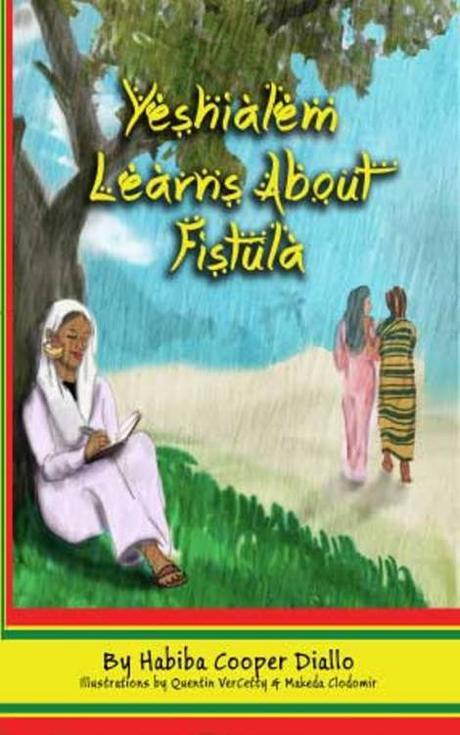Children's author and women's health advocate, Habiba Cooper Diallo is a 2014 American Express Ashoka Changemaker Emerging Innovator and one of Canada's Top 20 Under-20 for innovation, leadership and achievement.
She is also a young woman on a mission to help stir the conscience of the world by raising public awareness of obstetric fistula - the dreaded maternal health affliction that is destroying the lives of millions of women in Africa and Asia.
A Canadian born to a Jamaican mother and a Liberian father of Guinean parentage, Habiba said in 2008 she experienced a 'paradigm shift' after learning about obstetric fistula, which reportedly afflicts between 50,000 and 100,000 women worldwide every year, the vast majority of them in Sub-Saharan Africa and Asia.
Hahbiba has since devoted her life to advocating for the care and support of women suffering with fistula. In 2012 she founded the Women's Health Organization International (WHOI), a non-governmental organization dedicated to eradicating obstetric fistula in Africa and the African Diaspora, and to promoting women's health.
An award-winning public speaker, she has delivered speeches and presentations on the plight of fistula sufferers to audiences worldwide. For her efforts, she has been featured in Forbes, awarded the ZONTA Young Women in Public Affairs award, a Planet Africa Award for Academic Achievement and Innovation and the Herbert H. Carnegie Future Aces Award.

She recently launched Yeshialem Learns About Fistula, a children's book designed to educate the youth about fistula and the horrific effects it has on the lives of women.
An obstetric fistula occurs when a pregnant woman endures prolonged obstructed labour, sometimes lasting up to three days, as a result of the baby's head constantly pushing against her pelvic bone during contractions, thus impeding blood flow and causing tissue to die.
This creates a hole, or a 'fistula, between the woman's vagina and her bladder or rectum, and she nearly always loses her baby. If the mother lives, she is rendered incontinent and unable to hold her urine, and in some cases, her faeces. Often she is rejected by her husband and shunned by her village because of her foul smell and inability to bear more children.
"These women have so much shame and so much fear. They spend so much money on perfume trying to cover up the smell," Alison Heller, a doctorate student at Washington University in St. Louis, told CNN.
According to Fistula Foundation.org, 'fistula used to be prevalent in the U.S. and Europe, but was nearly eliminated in the latter part of the 19 th century and early 20 th century thanks to improved obstetric care in general and the use of C-sections in particular to relieve obstructed labor.'
In stark contrast to Europe and North America, it is estimated that more than two million young women live with untreated obstetric fistula in Asia and sub-Saharan Africa. Most of them live in poor rural areas. The Australian charity, Hamlin Fistula Ethiopia (Australia) says the death toll among young women suffering with fistula has halved in the last 20 years, from one woman dying in pregnancy or childbirth every minute, to one every two minutes.
These women are being debilitated - and in some cases suffering horrific deaths - as a result of a condition that is largely preventable. According to medical experts, approximately 80-95% of vaginal fistula can be corrected surgically. All it requires is a simple surgery to repair the hole in the bladder or rectum.
The root causes of fistula are grinding poverty and the low status of women and girls in their communities, where, all too often, their self esteem hinges largely on their worthiness to be wives and their ability to bear children. Invariably, these women have very limited or no access to modern health care systems, quality maternal health, basic and comprehensive emergency obstetric care and affordable treatment of fistula.
With the launch of her new book, Habiba has taken her campaign for the eradication of fistula to a new level. Yeshialem Learns About Fistula is touted as an 'entertaining, captivating and informative' tale set across diverse African landscapes. It follows the courageous Yeshialem on an epic adventure across the Sahara Desert during which she makes many friends who share with her secrets from ancient writing systems that show how to challenge the devastating medical condition-fistula-that damages the lives of so many women and girls.
Habiba says soon after she learned about fistula, at the age of 12, she decided to do some research on West African ethnic groups during her summer break. She subsequently, wrote an article about a young girl named Anafghat Ayouba from Niger's Tuareg people who had endured a four-day labour, which resulted in the still-birth of her child. She eventually developed a vesicovaginal fistula,
"I had never in my life encountered fistula and I was devastated to learn of the consequences-involuntary urination, shame and abandonment-that it had on the patients. Anafghat's fistula was successfully repaired by a team of surgeons in Niamey and she returned to school in her town, Tarbiyat. In re-establishing herself in her community, she spoke on the local radio about the need to end early marriage. Anafghat wanted to become a doctor, but suddenly she died from an infection a few years after her fistula had been repaired. I was struck by the tragedy of all that had happened in her life over such a short period. Anafghat's experience with obstetric fistula awoke in me a great desire to study more about the condition and to eventually lead awareness-building around the affliction."
Read more about Habiba's motivation for writing her new book. ( Link).
You can also check out her website and connect with her on Facebook to learn more about her fascinating experiences as she continues to advocate for the global eradication of fistula.
